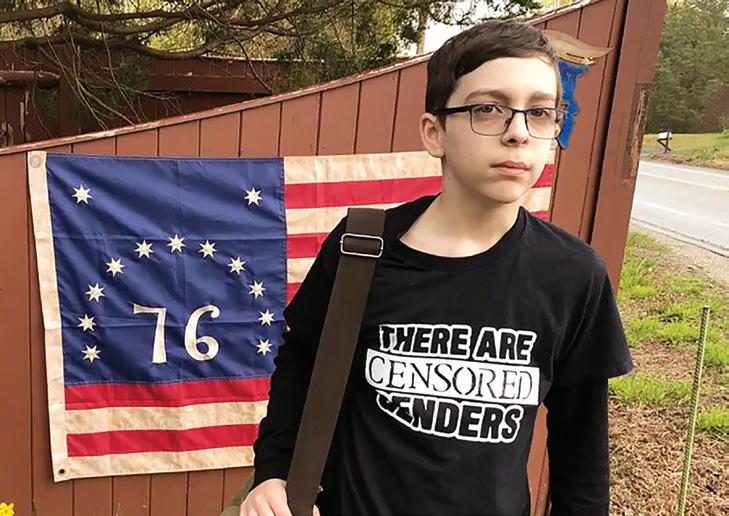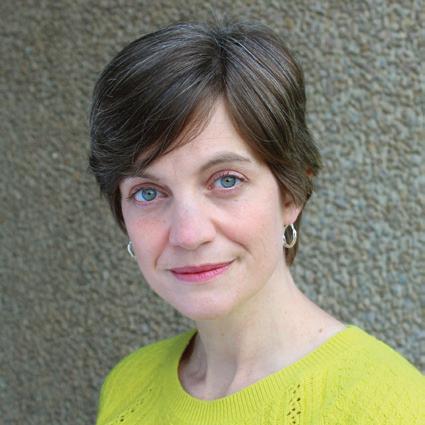
2 minute read
Tracker
Trends from nearby and around the world
Brighter Day
Advertisement
Are the kids alright?
Liam Morrison, a 12-year-old middle schooler in Middleborough, Mass., was pulled out of class and told his T-shirt was offensive. It read “There are only two genders.”
“I have been told that my shirt was targeting a protected class,” the boy told the school board in a video that has been viewed more than four million times. “Are their feelings more important than my rights? I don’t complain when I see pride flags and diversity posters hung throughout the school…because others have a right to their beliefs just as I do.”
IBSA ministry partner Alliance Defending Freedom (ADF) is representing Morrison in a federal lawsuit. “This isn’t about a T-shirt; this is about a public school telling a seventh grader that he isn’t allowed to hold a view that differs from the school’s preferred orthodoxy,” ADF said. They called the school’s action “a gross violation of the First Amendment.”
Culture: How many genders? Faith
How do you attend worship services?
Pew Research asked self-identified Evangelical adults about attendance. 70% participate monthly:
Ispent every Wednesday night of my childhood at church. From children’s choir to Girls in Action, where I learned about missionaries, it was a night focused on education and learning to live out my faith. And for a few weeks in my teen years, Wednesday night was when I learned to talk about that faith through an evangelism training program.
In 2021, Barna Research reported more than two-thirds of Christian teens say they haven’t received training to do evangelism. It’s not a surprising statistic for those who have watched most churches become less programmed and more focused on discipleship at the family level. But if you, like me, lean toward wistful when you remember the trainings and classes once so prevalent, there are signs of hope for the next generation of Christians learning to live out their faith.
First, the lack of “evangelism training” might be partially explained by a difference in terminology. While only 19% of teens said they’d been trained in evangelism, 47% said their church “definitely” does a good job equipping them to have conversations about their faith with someone who is not a Christian. Churches are still promoting evangelism among young believers, albeit with different resources and in less official formats.
It’s also possible our new day offers more opportunities for natural conversations about faith. Another Barna study released earlier this year found 74% of American adults say they would like to grow spiritually, and 44% are more open to God now than before the pandemic. In fact, Barna has labeled Gen Z “the open generation” for their willingness to engage on matters of faith.
One week last summer, our 7-year-old went to Vacation Bible School in the morning and art camp in the afternoon. During a break one day, she had a conversation with a fellow camper about what she’d learned at VBS. He professed a different faith than she did. When they realized they were at an impasse, she resolved to pray for him and, in her words, “went on with my day.”
George Barna says young Americans are endangered by growing syncretism, the fusion of religions.
“With only one out of every 50 millennials embracing a biblical worldview, America’s children are especially vulnerable to the inward-looking approach to life that their parents and most other adults practice….
“Biblical churches must see this as a time for an urgent response to the direction society is taking.
While the Left pursues the Great Reset, it is time for the Church to pursue the Great Renewal—leading people’s hearts, minds, and souls back to God and his life principles.”
The on-the-go nature of that encounter reminded me of the apostle Peter’s mandate to always be ready to give a reason for the hope we have. Yes, my Gen Z-ers are growing up with fewer of the beloved programs of my own childhood. But there are reasons to trust the kids really will be alright, even with less to do on Wednesday nights.
Meredith Day Flynn is a wife and mother of two living in Springfield. She writes on the intersection of faith, family, and current culture.











